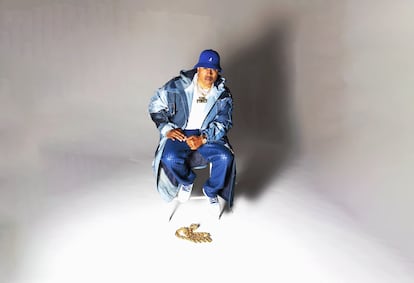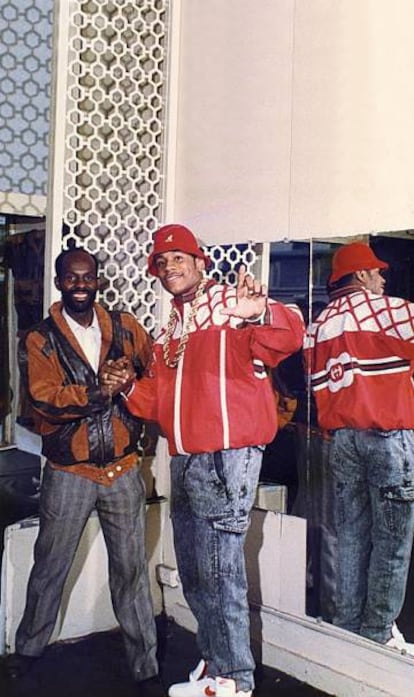LL Cool J: ‘You don’t lose the flow. It’s like Prince playing a guitar, Mick Jagger singing songs onstage’
At 56, the rapper from Queens, a fundamental part of hip-hop’s evolution, is now a living legend and a TV star whose new album ‘The FORCE’ features illustrious collaborators

For years, he’s been a certified celebrity, universally acknowledged as one of the most important and decisive figures in the history of hip-hop, with a longevity that beats out that of any other rapper in the game. Born as James Todd Smith in New York City in 1968, he had a turbulent childhood, not so much due to economic circumstance — he grew up in a middle-class environment in Queens — as to experiences of serious domestic violence. At four years old, he witnessed his father nearly kill his mother and grandfather at gunpoint. After his parents’ divorce, things hardly improved: his mom’s next boyfriend submitted him to constant physical and mental abuse. But the man now known as LL Cool J (an abbreviation of “Ladies Love Cool James,” a nickname given to him by fellow rapper Mikey D) has never exploited this tragic chapter in his life story. To the contrary, he’s invested nearly all his energy in celebrating how rap saved him from it.
By the end of the 1970s, hip-hop culture had exploded on the streets of the Bronx and reached those of Queens. Young James found himself at the right place at the right time. He began to rap at the age of nine, and it opened his eyes to the world around him. “Fun, really fun. We were just running around New York and creating, dreaming big. It was more for the love than anything, the love of creation. That’s where it came from,” says the performer enthusiastically on a video call. “Now you fast forward and here we are, 40 years later, still relevant all over the world. It’s actually amazing, it’s never been done before at this level, with all the sonic changes that have happened around the world. It’s about evolution. I’m just happy.”
From another rapper, such words could suggest a certain amount of ego — but that’s far from case with LL Cool J. In his interview with EL PAÍS, he doesn’t sound like your typical rapper. There are no barbs thrown at rivals, no inflated sense of self. Nor does he drop clickbait one-liners. He makes an effort to speak a few words in Spanish, is attentive and smiling (his most frequently used word during our talk is divertido, or fun) and is generally good-natured. Sure, he invokes his fair share of promotional cliché, but also provides real insight into his character. At one point, the rap heavyweight (he stands 6′3″ and weighs over 200 pounds) steps away from the camera, returning with a breakfast hamburger. He never takes off his sunglasses.
From the glory days of ‘Radio’ to retirement speculation
To pinpoint the defining moment of LL Cool J’s lengthy career, one would have to travel back to 1984, when he became one of the first artists signed to Rick Rubin’s legendary Def Jam label. Soon after, he’d release the debut single I Need a Beat, and a year later his first, historic album, Radio. That record is widely seen as having put an end to hip-hop’s pioneering foundational era, and opened the curtain on the genre’s golden age. It was both a critical and commercial success, sold a million records and was the first album released by Def Jam, establishing Rubin as one of the foremost producers on the planet.
Rubin and LL Cool J embarked on a journey together that would take the music industry by storm, accompanied by the moment’s other superlative stars, the Beastie Boys and Run-DMC, who started at Def Jam the same year. In 1986 and 1987, this trio formed the lineup of the historic Raising Hell tour. “Of course there was a rivalry between the three of us!,” says the Queens rapper. “But the important thing is that we were always friends and never had any problems. You know, I’m still competitive. I still want to be the best and have the biggest impact on people. It’s still important to me to be number one. I absolutely care about my music playing all over the world. Competition is the nature of hip-hop. It’s what we do, 100%.”

The artist says that when he got his start, rap was an underappreciated genre that eventually evolved in a more pop and commercial direction, while maintaining certain constants. “Ultimately, it’s about the love that you put into the music, and that can’t change,” he says. Those words could serve as a defense against accusations he received that he’d lost his authenticity with the release of 1989′s Walking With A Panther, his third album, which was criticized for its excess of syrupy ballads. Luckily for him, 1990′s Mama Said Knock You Out returned him to the critics’ favor and became the most successful record of his career, with more than two million albums sold.
His recording career stayed consistent from that point on, but after the release of his 10th studio album, 2013′s Authentic, he announced his retirement from music. For 11 years, he made good on that vow — until The FORCE appeared. Now, he downplays those retirement statements. “More than likely I was just teasing or trolling or playing, but art is not like working a normal job. You don’t retire from being an artist. I continue to love what I do, it’s still muy divertido, importante para mi corazón (important to my heart),” he says in a labored Spanglish.
Rapper, actor and host
It was around the time of the retirement announcement that he began to dedicate more time to an acting career he had been developing in parallel since 1985. He says his favorite role was the gangster he played for 2001′s In Too Deep, though his best-loved turns were surely on the series NCIS: Los Angeles and NCIS: Hawaii, on which he worked intermittently from 2008 to 2022, in addition to hosting the Grammy awards for five consecutive years, from 2012 to 2016.
In some ways, his trajectory has been similar to that of Steve Van Zandt, who is known to a sizable part of his audience due more to his roles on The Sopranos and Lilyhammer than as the guitarist for Bruce Springsteen’s E Street Band. “It’s just fun and actually, pretty cool,” says the rapper. “Now they get an opportunity to experience my music. But sometimes we get so caught up in trying to impress a new generation that we forget about our original fans. They’re important.”
LL Cool J has such a storied career that we nearly forgot that our interview had been granted in order to promote The FORCE, an excellent comeback album for which he acknowledges that he had to brush up on his rap kills. “It’s not that you lose the flow. It’s like Prince playing a guitar, Mick Jagger singing songs on stage, you continue to do what you do and you love it. But I did work on refreshing, to make sure it’s fresco (fresh), you know, real fresh,” he says. He says he didn’t want to try to plagiarize today’s trends, but neither did he want to return to exactly what he’d always done. “New ideas. It’s for now and the future. It was a matter of truth and fun, meeting people where I’m at this point in my life, creating something that can move their hearts, move their souls. It wasn’t any particular message, other than I just wanted to give them the opportunity to share this musical experience, let them feel that energy, and I hope I’ve done that.”
Surely fans will also appreciate the all-star lineup of collaborators on the album, a cast that seems like a homage to the history of hip-hop. LL Cool J gives much credit to the production work of Q-Tip (also known from his work with the ultra-influential group A Tribe Called Quest), but you can also find Eminem, Snoop Dogg, Nas and Busta Rhymes among its credits. “Yeah, there are some really big superstars on the record for sure, they’re my friends. And then there are some new artists as well, Don Pablito, J-S.A.N.D. and Mad Squablz. It wasn’t solo para nombre (just for the names), it was about when I listened to it, it being good for me,” says the performer.
The influence of Basquiat and a statue in Queens
Despite its focus on the rapper’s present, the album also features some nostalgia, such as on the track Basquiat Energy. “It was inspired by the movie Downtown 81,” in which Basquiat stars, LL Cool J says. “The song has that front groove that sounds like you’re in the Village in 1982 or ‘83. We filmed an amazing video visual to that song as well. I love Basquiat’s art.”
Though they were contemporaries, neighbors and to some extent, members of the same scene, LL Cool J says he never met the painter, who died in 1988, but that he’s always felt a certain closeness to him. “We had a lot of friends in common, like Fab Five Freddy, and I’m close with his sisters,” he says. New York has changed significantly since those days. “It’s a completely different city. For better, in a lot of ways, in terms of the buildings and all that. Creatively, it’s just a different world now. But it’s still beautiful, it’s still New York. I’m a New Yorker forever. You’re talking to somebody who is loyal to the logo,” he says, pointing to his Yankees hat.
It seems as though that pride is mutual, given that in 2022, the rapper was honored with the key to the city and a bronze LL Cool J statue was installed in Queens’ Corona Park. The figure carries a solar-powered boombox that pumps out a range of playlists. “To have that statue built, it’s important for my people, for the kids in the neighborhood, because they have somebody they can look at and say it’s possible. For me, it’s an amazing feeling, just like being inducted into the Rock & Roll Hall of Fame. That’s the part of being an artist that’s really the most fun,” says the performer.
Sign up for our weekly newsletter to get more English-language news coverage from EL PAÍS USA Edition
Tu suscripción se está usando en otro dispositivo
¿Quieres añadir otro usuario a tu suscripción?
Si continúas leyendo en este dispositivo, no se podrá leer en el otro.
FlechaTu suscripción se está usando en otro dispositivo y solo puedes acceder a EL PAÍS desde un dispositivo a la vez.
Si quieres compartir tu cuenta, cambia tu suscripción a la modalidad Premium, así podrás añadir otro usuario. Cada uno accederá con su propia cuenta de email, lo que os permitirá personalizar vuestra experiencia en EL PAÍS.
¿Tienes una suscripción de empresa? Accede aquí para contratar más cuentas.
En el caso de no saber quién está usando tu cuenta, te recomendamos cambiar tu contraseña aquí.
Si decides continuar compartiendo tu cuenta, este mensaje se mostrará en tu dispositivo y en el de la otra persona que está usando tu cuenta de forma indefinida, afectando a tu experiencia de lectura. Puedes consultar aquí los términos y condiciones de la suscripción digital.








































